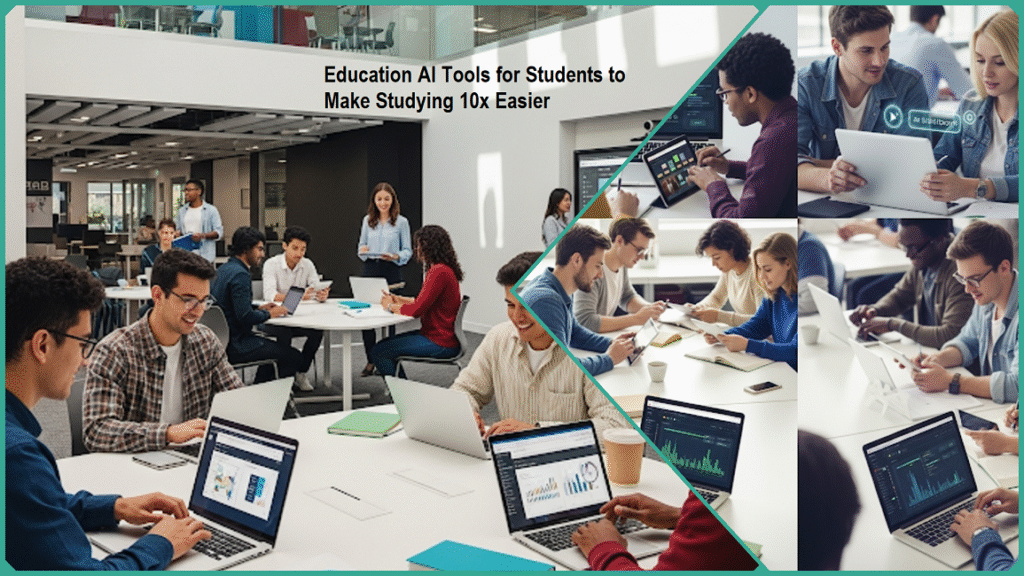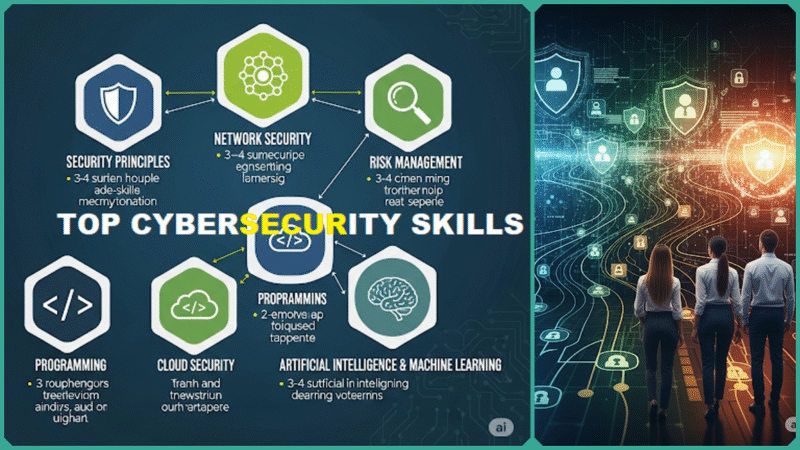Education AI Tools for Students to Make Studying 10x Easier
Estimated reading time: 16 minutes
Students at every level encounter increasing challenges—from handling demanding workloads and intricate subjects to meeting strict deadlines and maintaining motivation in today’s fast-paced academic environment. Fortunately, Artificial Intelligence (AI) provides innovative solutions that boost study efficiency and promote academic achievement.
Education AI tools leverage advanced algorithms to support students in researching, writing, organizing, learning, and test preparation, significantly reducing effort while enhancing results. Whether high schoolers are preparing for exams, university students are managing demanding assignments, or lifelong learners are expanding their skills, these AI-powered platforms can make studying up to ten times more efficient.

This blog post delves into the most powerful AI tools for education in 2025, explaining how they function, their advantages, and practical methods for students to incorporate them into their study habits. Our aim is to help you use these tools effectively and ethically to boost productivity, enhance understanding, and maintain academic integrity.
What Are Education AI Tools?
Education AI tools are sophisticated software applications powered by artificial intelligence designed to simplify and enhance various academic tasks for students. They span a wide range of functionalities, including AI writing assistants, personalized tutors, research helpers, organizational tools, and exam preparation platforms.
These tools operate by understanding natural language, generating and summarizing content, providing personalized feedback, and automating repetitive study-related processes. Their key capabilities include:
- Automated writing support: Assisting students in producing well-structured essays, thoroughly proofreading their work for errors, effectively paraphrasing text to avoid plagiarism, and generating accurate citations in various formats.
- Research assistance: Providing comprehensive support in locating credible and reliable academic sources, thoroughly summarizing complex research papers, and efficiently extracting the most essential and relevant information to aid in informed decision-making and deeper understanding.
- Note-taking and organization: Effectively transcribing lectures in detail, carefully managing and planning study schedules to maximize productivity, and systematically organizing all study materials for easy access and better retention.
- Personalized tutoring: Providing clear and detailed explanations of complex concepts, offering comprehensive step-by-step guidance to solve problems effectively, and tailoring the teaching approach to match the unique learning pace and style of each student, ensuring a deeper understanding and improved academic performance.
- Exam preparation: Developing comprehensive quizzes, interactive flashcards, and personalized study plans that are carefully tailored to enhance and maximize your test readiness and overall academic performance.
These advanced AI tools assist students in saving a considerable amount of time, improving their comprehension of complex subjects, enhancing the overall quality of their academic work, and managing heavy workloads more efficiently.
By doing so, they make the process of studying significantly easier and far more productive. When used responsibly and thoughtfully, these tools act as intelligent assistants that support learning rather than replacing the essential skills of critical thinking and active engagement in the educational process.
Why Education AI Tools Matter for Students Today
Education AI tools are incredibly important for students today because they effectively tackle a wide range of common challenges that learners encounter at every academic stage, from elementary school all the way through higher education.
These innovative tools provide personalized support and resources that help students overcome difficulties in understanding complex subjects, managing their time efficiently, and staying motivated throughout their studies.
Here is a more detailed explanation of why these AI-powered educational tools have become essential in the landscape of modern education today:
- Saving Time: Students often spend excessive time on routine and repetitive tasks such as formatting papers, organizing notes, or searching for relevant research sources. AI tools automate many of these administrative and tedious tasks, allowing students to focus more on truly understanding content rather than getting bogged down in procedural details. This time saved can then be redirected towards deeper learning or other priorities.
- Improving Comprehension: Artificial intelligence can present information in multiple formats and at varying levels of complexity. Through interactive tutoring and layered explanations, AI tools help break down complex concepts into understandable chunks tailored to a student’s current knowledge level. This personalization ensures that students grasp difficult topics more effectively, reducing frustration and improving retention.
- Enhancing Academic Quality: Quality academic work requires clear, error-free writing and proper citation of sources to avoid plagiarism. AI-powered writing assistants like Grammarly and others help polish grammar, tone, and style, while also suggesting or auto-generating citations. This boosts the professionalism and integrity of student assignments and can improve grades significantly.
- Boosting Motivation and Focus: Managing study schedules, deadlines, and resources can often lead to overwhelm or procrastination. AI tools help organize workflows, set reminders, and provide instant feedback on assignments or quizzes. This structure supports sustained motivation and focus by making the learning process feel more manageable and rewarding.
- Fostering Personalized Learning: Every student learns differently, with unique strengths and areas for improvement. AI tools adapt to individual learning styles, pacing, and needs, offering personalized recommendations, practice problems, and learning resources. This tailored approach maximizes engagement and efficiency, helping students progress faster and with greater confidence.
In Summary
Education AI tools do not replace the essential skills of critical thinking, creativity, and active learning, which remain fundamental to a student’s success. Instead, these advanced technologies serve as intelligent assistants designed to make the studying process more manageable, efficient, and even enjoyable by helping students overcome a variety of key academic hurdles.
By providing this kind of support, learners are empowered to better balance their workloads, deepen their understanding of complex subjects, and ultimately perform at their very best in the face of increasingly demanding and competitive educational environments.
Top Education AI Tools for Students in 2025
Here is an updated, comprehensive, and detailed overview of the top education AI tools for students in 2025, carefully compiled based on the latest expert sources, extensive usability studies, and valuable student feedback from various learning environments:
| AI Tool | Main Features | Benefits for Students | Pricing (Typical) |
|---|---|---|---|
| ChatGPT | AI-powered essay/report generation, personalized tutoring, coding help, language translation | Instant writing assistance, brainstorming, clear explanations of complex topics, and multi-subject tutoring | Free / Plus ($20/mo) / Pro ($200/mo) |
| Grammarly | Grammar and spelling correction, tone adjustment, plagiarism detection | Perfects academic writing, ensures error-free and polished documents | Free / Premium ($12/mo) |
| QuillBot | Paraphrasing, summarization, vocabulary enhancement | Helps rewrite and clarify academic writing to avoid plagiarism | Free / Premium ($8.33/mo) |
| Elicit | AI-assisted literature review, paper summarization, citation suggestions | Speeds up research by finding and summarizing scholarly articles | Free |
| Socratic by Google | Homework help with step-by-step solutions, especially in math and science | Provides quick homework support and concept breakdown | Free |
| Canva | AI design assistance, templates for presentations and posters | Simplifies the creation of academic visuals and projects | Free / Pro ($12.99/mo) |
| Otter.ai | Live lecture transcription and note-taking | Captures accurate, searchable class notes without distraction | Free / Premium ($8.33/mo) |
| Exam AI | AI-generated quizzes, flashcards, personalized study plans | Helps students prepare effectively for exams | Subscription based |
| Caktus AI | Math problem solving, coding help, and research paper summarization | College-level tutoring and writing assistance | Varies |
| Quadratic | AI-powered research automation in spreadsheets, data visualization, and coding support | Ideal for data-heavy projects and research workflows | Subscription based |
Highlights of Key Tools
- ChatGPT functions as a highly effective virtual study buddy, providing invaluable assistance to students by helping them generate well-structured essays, debug challenging code, brainstorm innovative ideas, and receive personalized tutoring on complex and difficult concepts. Its advanced conversational AI capabilities foster a deeper understanding of subjects and encourage enhanced creativity throughout the learning process.
- Grammarly is an indispensable tool for students who require polished, error-free writing. It offers valuable tone and style suggestions that enhance clarity and effectiveness, while also providing comprehensive plagiarism checks to help maintain academic integrity throughout their work.
- Elicit dramatically enhances the research process by rapidly locating relevant scholarly materials across various disciplines, efficiently summarizing complex academic papers, and intelligently recommending pertinent citations. This powerful tool significantly reduces the time and effort typically spent on manual literature reviews, allowing researchers to focus more on analysis and innovation.
- Socratic by Google uses advanced AI technology to offer instant homework hints and comprehensive, step-by-step problem-solving guidance, particularly focused on STEM subjects. This makes it an excellent tool for students seeking quick and reliable academic support whenever they are on the move or need immediate assistance.
- Quadratic provides a distinctive, spreadsheet-focused AI platform designed to streamline and automate various tasks such as research, data analysis, visualization, and coding. This innovative environment proves to be extremely valuable, especially when handling complex academic projects that require meticulous attention to detail and efficient management of large datasets.
Additional Popular AI Tools in 2025
- Querium is a specialized artificial intelligence tutor designed specifically for STEM subjects, providing detailed step-by-step feedback to help students understand complex concepts more effectively and improve their problem-solving skills.
- TutorMe is an advanced AI-powered platform designed to connect students with experienced, real-time tutors instantly. This innovative service leverages cutting-edge technology to provide personalized learning assistance whenever students need it, ensuring immediate support and guidance throughout their educational journey.
- Gradescope is a powerful tool designed for automated grading and providing instant feedback on assignments, significantly streamlining the evaluation process for educators while enhancing the learning experience for students.
- Notion is a comprehensive, all-in-one workspace designed for efficiently organizing your notes, managing tasks, and scheduling your daily activities. It provides a versatile platform that combines note-taking, task management, and calendar scheduling into one seamless and user-friendly interface, allowing users to streamline their productivity and keep everything in one convenient place.
These innovative AI tools demonstrate how students in the year 2025 can significantly boost their academic efficiency, deepen their understanding of complex subjects, and greatly enhance their overall productivity by thoughtfully and responsibly incorporating artificial intelligence into their daily study habits and routines. By leveraging these advanced technologies, learners are empowered to optimize their educational experience and achieve better outcomes in their academic pursuits.
Emerging Trends in AI for Education
Emerging trends in artificial intelligence for education demonstrate a significant and powerful shift toward creating more personalized, collaborative, and multimodal learning experiences. At the same time, there is an increasing and important emphasis on the ethical use of AI technologies in educational settings.
These combined developments aim to optimize educational outcomes while maintaining and enhancing the integrity and fairness of the learning process for all students.
Adaptive Learning
AI-powered adaptive learning platforms dynamically tailor course content to individual student progress, learning styles, and needs, optimizing retention and engagement. Using machine learning algorithms and real-time data analysis, these systems adjust difficulty, pace, and instructional methods to suit each learner.
They provide immediate feedback to help students identify and address weaknesses promptly. AI tutors simulate human guidance, delivering personalized explanations, practice problems, and supplementary resources. Adaptive learning not only boosts comprehension and motivation but also supports inclusivity by accommodating diverse learning abilities and preferences.
Implementing these systems requires careful attention to student data privacy, equity of technology access, and mitigating algorithmic bias. When well-integrated, adaptive learning can transform education by making personalized instruction scalable and accessible.
Collaborative AI Tools
AI integration into group projects and educational collaboration significantly enhances teamwork by enabling advanced features such as shared document editing, automated feedback, and dynamic content generation. These innovative tools facilitate much smoother communication and more effective cooperative learning experiences, ultimately boosting both productivity and creativity within student teams.
Collaborative AI not only fosters peer learning but also allows for real-time formative assessment, providing students with continuous opportunities to improve collectively and deepen their understanding through active collaboration.
Multimodal Learning Support
Modern AI systems incorporate a variety of media, including text, audio, video, and interactive simulations, to effectively address and accommodate a wide range of diverse learning preferences. By simultaneously engaging multiple sensory and cognitive pathways, these AI-driven multimodal platforms significantly enhance both comprehension and long-term retention of information.
Cutting-edge technologies such as virtual reality (VR) and augmented reality (AR), when integrated with advanced AI capabilities, offer deeply immersive and experiential learning environments. This approach is especially valuable and effective for teaching complex or abstract subject matter that can be difficult to grasp through traditional methods alone.
Ethical AI Use Education
As AI tools proliferate in education, schools and platforms increasingly emphasize teaching responsible AI use. This includes fostering academic integrity by ensuring students understand the difference between AI-assisted learning and plagiarism, promoting critical evaluation of AI-generated content, and encouraging transparency with educators.
Institutions are developing guidelines and instructional programs to educate learners on ethical AI practices, privacy considerations, and avoiding overreliance on AI in a way that undermines learning and originality.
In Summary
Emerging trends in artificial intelligence within the field of education are increasingly focused on developing more personalized, engaging, and equitable learning experiences for students of all backgrounds. At the same time, there is a strong emphasis on embedding robust ethical frameworks to ensure the responsible, fair, and transparent use of AI technologies.
These cutting-edge innovations hold significant promise for transforming education by making it more adaptive to individual needs, fostering greater collaboration among learners and educators, and enhancing overall effectiveness. Such advancements have the potential to benefit diverse learners across the globe, helping to create a more inclusive and supportive educational environment for everyone.
How to Use Education AI Tools Responsibly
Using education AI tools responsibly is absolutely essential for maintaining academic integrity and ensuring that students benefit fully from the powerful capabilities these technologies offer. It is important to approach these tools with a clear understanding of ethical use to avoid any potential misuse or academic dishonesty.
Here are some practical and actionable guidelines designed to help students use these AI tools both ethically and effectively in their educational pursuits:
Use AI as an Assistant, Not a Replacement
- Treat AI as a support tool that helps you brainstorm ideas, clarify concepts, or overcome writer’s block.
- Avoid having AI generate entire essays, assignments, or projects for you without your active involvement. Your critical thinking and originality must remain at the core of your work.
Verify AI-Generated Information
- AI tools can sometimes produce inaccurate, outdated, or incomplete information. Always cross-check facts, data, and references with trustworthy and credible sources such as academic journals, textbooks, or official websites.
- Developing the habit of verifying fosters critical thinking and prevents the spread of misinformation.
Avoid Plagiarism by Proper Paraphrasing and Citation
- When AI helps generate or rephrase content, ensure you properly paraphrase with your understanding and wording.
- Always cite any direct quotes, ideas, or data that come from AI outputs or any other sources, following your institution’s citation style guidelines. This maintains transparency and respects intellectual property.
Use AI to Enhance Understanding, Not to Shortcut Learning
- Engage actively with the AI suggestions; use them as learning aids rather than quick fixes. For example, if AI explains a complex topic, take notes, ask follow-up questions, and seek additional explanations to deepen comprehension.
- This approach turns AI from a mere content generator into a genuine educational partner.
Maintain Transparency with Educators
- Some institutions require disclosure when students use AI tools in their work. Be open about your AI usage when asked or when policies require it.
- Transparency builds trust and helps educators guide you on appropriate AI use, balancing assistance with academic standards.
In Summary
Responsible and effective use of education AI tools involves thoughtfully leveraging their unique strengths to significantly enhance and support your learning process. At the same time, it is essential to uphold core values such as honesty, originality, and critical engagement with the material. B
y carefully following these recommended best practices, you can successfully maximize the numerous benefits that AI technologies offer, all while developing your academic skills in a manner that is both authentic and ethically sound. This balanced approach ensures that you not only improve your knowledge but also maintain integrity and personal growth throughout your educational journey.
FAQs
Can AI tools replace traditional studying?
AI tools are designed to support and enhance studying by making tasks easier and more efficient. However, deep learning requires active engagement, critical thinking, and personal effort from students. AI should be seen as an assistant, not a replacement for traditional learning.
Are these AI tools free to use?
Many education AI tools offer free versions with basic features suitable for general use. To access advanced or premium features, subscriptions or one-time payments are often required. Always check each tool’s pricing model to find the best fit for your budget and needs.
Will using AI tools harm my learning capacity?
When used responsibly, AI tools can significantly improve understanding, productivity, and study habits. However, overreliance on AI-generated answers without personal analysis or active learning may negatively impact your ability to develop critical skills and deep comprehension.
How do I choose the best AI tool for my needs?
Start by identifying your main academic challenges, such as writing, conducting research, organizing notes, or preparing for exams. Then select AI tools that specialize in those areas. For example, choose Grammarly for writing polishing or Elicit for research assistance. Trying free versions first can help you gauge suitability.
Are AI tools effective for all subjects?
Most AI education tools are versatile and support a wide range of subjects. However, some are specialized—for instance, Socratic by Google focuses on STEM homework help, while Canva aids visual project design. Match the tool’s strengths with your subject requirements for best results.
In Conclusion
Education AI tools have fundamentally revolutionized the way students approach studying in 2025, providing smarter, faster, and more personalized learning experiences than ever before. Platforms like ChatGPT offer a comprehensive suite of writing assistance, tutoring, and brainstorming support, enabling students to tackle complex assignments and deepen their understanding.
Grammarly meticulously enhances writing quality to ensure polished, professional, and plagiarism-free work, while Socratic by Google delivers instant homework help and step-by-step explanations, especially useful for STEM subjects.
Together, these AI-powered tools empower students to effectively manage academic workloads, reduce study time, and overcome common learning obstacles with greater confidence and efficiency. The key to maximizing these benefits lies in integrating AI tools wisely and ethically—using them as valuable assistants that enhance critical thinking and creativity rather than replacing the effort and engagement essential to genuine learning.
By embracing these innovations responsibly, students unlock their full academic potential, turning studying into a more manageable, productive, and even enjoyable journey. As AI continues to evolve, the future of education promises even more exciting opportunities to personalize and enrich learning for diverse learners worldwide.
Explore these innovative AI tools today, customize and adapt them to fit your unique learning needs, and completely transform your educational journey to achieve academic success on a level you’ve never experienced before. Your path to smarter, more efficient study habits begins right now, setting you up for lasting achievement and growth.
Discover more from Skill to Grow
Subscribe to get the latest posts sent to your email.






